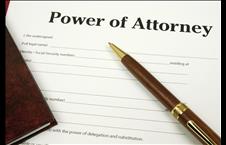|
Important Estate Planning Tips
Monday, April 25, 2016

In order to predict how much your estate will have to pay in taxes, one must first determine the value of the estate. To determine this, many assets might have to be appraised at fair market value. The estate includes all assets including real estate, cash, securities, stocks, bonds, business interests, loans receivable, furnishings, jewelry, and other valuables.
Once your net worth is established, you can subtract liabilities like mortgages, credit cards, other legitimate debts, funeral expenses, medical bills, and the administrative cost to settle your estate including attorney, accounting and appraisal fees, storage and shipping fees, insurances, and court fees. The administrative expenses will likely total roughly 5% of the total estate.
Read more . . .
Monday, April 18, 2016

A durable power of attorney is an important part of an estate plan. It provides that, in the event of disability or incapacitation, a preselected agent can be granted power over the affairs of the individual signing the document. This power can be limited to specific decisions, like the decision to continue life sustaining treatment, or it can be much broader in scope to allow the agent power over the individual’s financial dealings.
Estate planning is meant to prepare for contingencies beyond an individual’s control. A traumatic accident could leave an individual without the ability to manage his or her own financial affairs.
Read more . . .
Monday, April 11, 2016

An executor is responsible for the administration of an estate. The executor’s signature carries the same weight of the person whose estate is being administered. He or she must pay the deceased’s debts and then distribute the remaining assets of the estate. If any of the assets of the estate earn money, an executor must manage those assets responsibly. The process of doing so can be intimidating for an individual who has never done so before.
Read more . . .
Monday, March 28, 2016
 The role of an executor is to effectuate a deceased person’s wishes as declared in a will after he or she has passed on. The executor’s responsibilities include the distribution of assets according to the will, the maintenance of assets until the will is settled, and the paying of estate bills and debts. An old joke says that you should choose an enemy to perform the task because it is such a thankless job, even though the executor may take a percentage of the estate’s assets as a fee. The following issues should be considered when choosing an executor for one's estate.
Competency: The executor of an estate will be going through financial and legal documents and transferring documents from the testator to the beneficiaries. Read more . . .
Monday, March 21, 2016
3137.jpg)
A Pooled Income Trust is a special type of trust that allows individuals of any age (typically over 65) to become financially eligible for public assistance benefits (such as Medicaid home care and Supplemental Security Income), while preserving their monthly income in trust for living expenses and supplemental needs. All income received by the beneficiary must be deposited into the Pooled Income Trust which is set up and managed by a not-for-profit organization.
In order to be eligible to deposit your income into a Pooled Income Trust, you must be disabled as defined by law. For purposes of the Trust, "disabled" typically includes age-related infirmities. The Trust may only be established by a parent, a grandparent, a legal guardian, the individual beneficiary (you), or by a court order.
Typical individuals who use a Pool Income Trust are: (a) elderly persons living at home who would like to protect their income while accessing Medicaid home care; (2) recipients of public benefit programs such as Supplemental Security Income (SSI) and Medicaid; (3) persons living in an Assisted Living Community under a Medicaid program who would like to protect their income while receiving Medicaid coverage.
Medicaid recipients who deposit their income into a Pool Income Trust will not be subject to the rules that normally apply to "excess income," meaning that the Trust income will not be considered as available income to be spent down each month. Supplemental payments for the benefit of the Medicaid recipient include: living expenses, including food and clothing; homeowner expenses including real estate taxes, utilities and insurance, rental expenses, supplemental home care services, geriatric care services, entertainment and travel expenses, medical procedures not provided through government assistance, attorney and guardian fees, and any other expense not provided by government assistance programs.
As with all long term care planning tools, it’s imperative that you consult a qualified estate planning attorney who can make sure that you are in compliance with all local and federal laws.
Monday, March 14, 2016
 How is the funding handled if you decide to use a living trust? How is the funding handled if you decide to use a living trust?
Certificates represent shares of a company. There are generally two types of company shares: those for a publicly traded company, and those for a privately held company, which is not traded on one of the stock exchanges.
Let's assume you hold the physical share certificates of a publicly held company and the shares are not held in a brokerage account. If, upon your death, you own shares of that company's stock in certificated form, the first step is to have the court appoint an executor of your estate.
Once appointed, the executor would write to the transfer agent for the company, fill out some forms, present copies of the court documents showing their authority to act for your estate, and request that the stock certificates be re-issued to the estate beneficiaries.
There could also be an option to have the stock sold and then add the proceeds to the estate account that later would be divided among the beneficiaries. If the stock is in a privately held company there would still be the need for an executor to be appointed to have authority. However, the executor would then typically contact the secretary or other officers of the company to inquire about the existence of a shareholder agreement that specifies how a transfer is to take place after the death of a shareholder. Depending on the nature of the agreement, the company might reissue the stock in the name(s) of the beneficiaries, buy out the deceased shareholder’s shares (usually at some pre-determined formula) or other mechanism.
If you set up a revocable living trust while you are alive you could request the transfer agent to reissue the stock titled into the name of the trust. However, once you die, the "trustee" would still have to take similar steps to get the stock re-issued to the trust beneficiaries.
If you open a brokerage account with a financial advisor, the advisor could assist you in getting the account in the name of your trust, and the process after death would be easier than if you still held the actual stock certificate.
Monday, February 29, 2016

When someone dies without a will, it is known as dying intestate. In such cases, state law (of the state in which the person resides) governs how the person's estate is administered. In most states, the individual's assets are split -- with one third of the estate going to the spouse and all surviving children splitting the rest. For people who leave behind large estates, unless they have established trusts or other tax avoidance protections, there may be a tremendous tax liability, including both estate and inheritance tax.
For just about everyone, the cost of having a will prepared by a skilled and knowledgeable attorney is negligible when compared to the cost of dying intestate, since there are a number of serious consequences involved in dying without a proper will in place.
Legal Consequences
The larger your estate, the more catastrophic the consequences of dying intestate will be. If you die without a will, the freedom to decide how your property will be divided will be taken from you and the state in which you reside will divide your assets.
Not only will you not be able to decide on the distribution of your property, but a stranger will be making personal, familial decisions. This may be divisive among your family members; instead of leaving your loved ones in peace, you may leave them engaged in bitter disputes over a family heirloom or even a simple memento. This can be especially true in situations where there are children from a previous marriage.
Tax Consequences
In addition to the legal and personal problems associated with dying intestate, the tax results can be severe as well. This is particularly true for clients who have not consulted with an estate planning attorney in order to protect themselves through tax avoidance methods. Both the state and federal governments can tax the transfer of property and an inheritance tax may be imposed on the property you have left to your heirs.
The most effective way to avoid all of these negative tax consequences is to create a will with a competent attorney. Your lawyer will help you to choose a proper executor (the person who will administer your estate, distribute your property and pay your debts), and will assist you in finding ways to limit your tax liability. There are several ways your attorney can help you to do this:
- By gifting some of those you want to inherit before you die
- By creating one or several trusts
- By purchasing a life insurance policy
- By buying investments in your loved one's name
These methods will ensure that your loved ones receive the assets you desire them to have, while simultaneously protecting them from possibly enormous tax burdens after you pass.
For those who have no family, dying without a will can be even more troublesome and costly, since their entire fortunes can be left to the state. If a genealogical search doesn't turn up any blood relatives, all of your assets will be claimed by the government. This means that any individual, group, organization or charity you wished to endow will receive nothing.
It is never easy to think of one's own mortality, but it is even more painful to contemplate leaving a messy, uncomfortable situation behind when you pass. By engaging the services of an excellent estate planning attorney, who will help you fashion a legally binding, precisely designed document, you can make sure that your loved ones are well taken care of and that your final wishes are respected and implemented.
Monday, February 15, 2016

In this computer age, when so many tasks are accomplished via the internet -- including banking, shopping, and important business communications -- it may seem logical to turn to the internet when creating a legal document such as a will . Certainly, there are several websites advertising how easy and inexpensive it is to do this. Nonetheless, most of us know that, while the internet can be a wonderful tool, it also contains a tremendous amount of erroneous, misleading, and even dangerous information.
In most cases, as with so many do-it-yourself projects, creating a will most often ends up being a more efficient, less expensive process if you engage the services of a qualified attorney. Just as most of us are not equipped to do our own plumbing repairs or automotive repairs, most of us do not have the background or experience to create our own legal documents, even with the help of written directions.
Situations that Require an Attorney for Will Creation
In certain cases, the need for an estate planning attorney is inarguable. These include situations in which:
- Your estate is large enough to make estate planning guidance necessary
- You want to disinherit your legal spouse
- You have concerns that someone may contest your will
- You worry that someone will claim your mind wasn't sound at the signing
Mistakes and Omissions
It has always been possible to write a will all by yourself, even before the advent of the typewriter, let alone the computer. Such a document, however, is unlikely to deal with the complexities of modern life. Many estate planning attorneys have seen, and often been asked to repair, wills that have mistakes or significant omissions. These experts have also become aware of situations in which the survivors of the deceased wind up in court, spending thousands of dollars to contest ambiguously worded or incomplete wills. Without legal guidance from a competent estate planning attorney, creating a "boxtop" will can result in tremendous financial and emotional risk.
Evidence that Online Wills Are Not Foolproof
Evidence that many other complications can arise when an individual creates a will using generalized online directions can be found in the following facts:
- Each state has its own rules (e.g. requiring differing numbers of disinterested party signatures)
- Even uncontested wills can remain in probate if not executed in an exacting fashion
- Estate planning attorneys find legal software programs inadequate
- Even legal websites themselves recommend bringing in an attorney in all but the very simplest cases
- Some legal websites provide inexpensive monthly legal consultations with attorneys to protect their client and themselves
Areas that Frequently Cause Problems
Self-constructed wills often become problematic when the testator:
- Names an executor who has no financial or legal knowledge
- Leaves a bequest to a pet (legally, you must leave the bequest to an appointed caretaker)
- Puts conditions on payouts to an that are difficult, or impossible, to enforce
- Makes unusual end-of-life decisions or puts living will information into the will
- Designates guardians for children, but neglects to name successor guardians
- Neglects to coordinate beneficiary designations where, for example, the will and insurance policy designations contradict one another
- Leaves funeral instructions into the will since the document will most likely not be read until after the funeral has taken place
- Leaves inexact or ambiguous instructions dealing with blended families
- Neglects to mention small items in the will which, though of small financial value, are meaningful to loved ones and may cause contention
In order to ensure that you leave your assets in the hands of those you wish, and to avoid leaving your loved ones with bitter disputes and expensive probate costs, it is always wise to consult with an experienced estate planning attorney when making a will. In this area, as in so many others, it is best, and safest, to make use of those with expertise in the field.
Monday, February 8, 2016

A life estate is a special designation in probate law referring to a gift to a family member that lasts as long as the life of the recipient. If an individual uses a life estate as part of his or her estate plan, whatever is bequeathed under the life estate will revert back to the residual estate upon the death of the life estate recipient. It is most common in scenarios where an individual starts a new family without children later in life and wants to ensure that the present spouse is taken care of for the remainder of her or his life. The owner of a life estate is called a life tenant. A life estate is often used as an alternative to a trust because it provides the life tenant with more control over the transferred asset.
Read more . . .
Monday, January 25, 2016

While the terms "estate tax" and "inheritance tax" are often used interchangeably, they are not synonymous. Let's try to clarify the difference.
Estate Tax
Estate tax is based on the net value of the deceased owner's property. An estate tax is applied to these assets when they are transferred to the beneficiary. It is important to remember that an estate tax doesn't have anything to do with the beneficiary or that person's resources.
Read more . . .
Tuesday, January 19, 2016

The conversation about a person’s last wishes can be an awkward one for both the individual who is the topic of conversation and his or her loved ones. The end of someone’s life is not a topic anyone looks forward to discussing. It is, however, an important conversation that must be had so that the family understands the testator’s final wishes before he or she passes away. If a significant sum is being left to someone or some entity outside of the family, an explanation of this action may go a long way to avoiding a contested will. In a similar vein, if one heir is receiving a larger share of the estate than the others, it is prudent to have this action explained.
Read more . . .
Attorney Irene V. Villacci represents clients throughout Nassau and Suffolk Counties and the surrounding areas, including: Queens, Brooklyn, Staten Island, Bronx and Manhattan.
Prior results do not guarantee similar outcome.
|

|
|
|